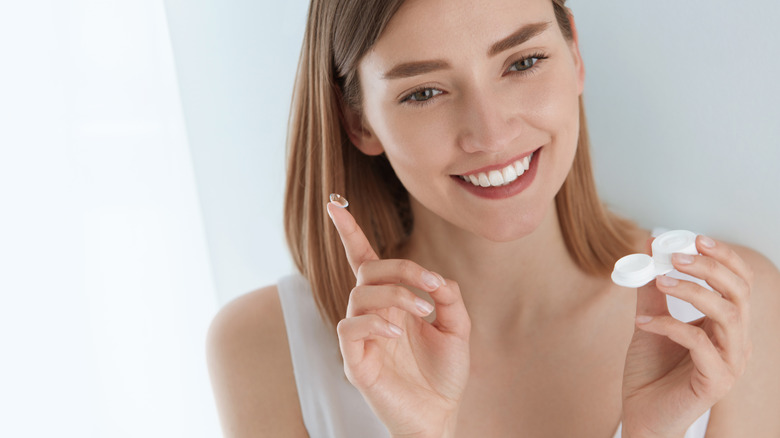How Often You Should Replace Your Contacts?
Contact lenses are a popular alternative to glasses for people who have blurry vision. After a few weeks of wearing contacts for the first time, many people forget they're even on their eyes. Every contact wearer knows the importance of removing them at the end of the day, but how often should the contacts themselves be replaced? It depends on which kind of contact you use.
Soft contacts generally fall into two categories: long-term lenses and disposable lenses. Long-term or extended wear contact lenses can be reused for up to a month before they need to be replaced (via US Food and Drug Administration). Disposable lenses are meant to be worn for a short period of time before being replaced. Some disposable lenses need to be replaced every day and others can go up to a week.
Any contact lens that is reused needs to be properly cleaned between uses. Dirt and germs trapped in your lenses can cause injuries to your eyes and introduce bacteria to the area. Wash your hands before removing your contacts and then rinse them with a sterile saline solution (via American Academy of Ophthalmology). You need to be extra diligent when cleaning contacts that are meant to be worn for several weeks, as these pose the highest risk of causing health issues.
Contact lenses need to be removed every night
Regardless of what type of contact lenses you use, they should always be removed at night. "Most people can safely and comfortably wear contact lenses for up to about 12 hours per day, though I always recommend giving your eyes a chance to breathe without lenses in," Caryn Nearnberg, OD, an optometrist based in New York City, told Well + Good. Contact lenses prevent your eye from absorbing as much oxygen during the day. This can make your eyes "more prone to infections, blood vessel growth into the eye, and inflammation and redness that can lead to vision loss and contact lens intolerance," Dr. Nearnberg said.
Because they are replaced every day, optometrists often recommend daily lenses when possible. "Daily disposable contacts are exactly what they say — a fresh pair is used every day," Dr. Nearnberg said. "These lenses are thinner, allowing for more oxygen to the cornea, making them healthier for your eyes."
It's important to follow your eye doctor's directions concerning how often to replace your contacts. Not replacing them frequently enough can lead to irritation and eye infections.


